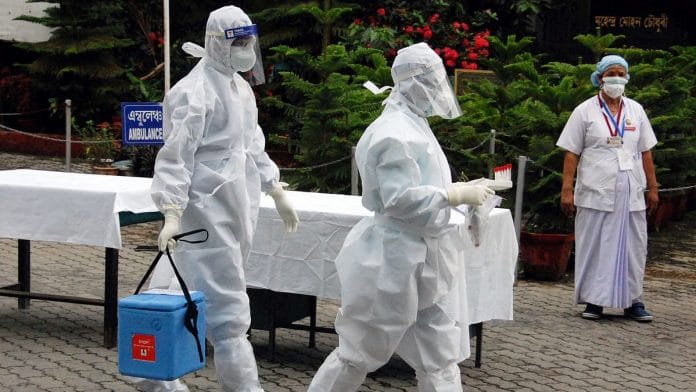New Delhi: The Delta variant of SARS-CoV-2 is a “great concern” and an aggressive vaccination campaign needs to be instituted in India as soon as possible to tackle it, notes an article in the Indian Journal of Medical Research.
A monthly peer-reviewed journal, IJMR is a publication of the country’s apex medical research body Indian Council of Medical Research (ICMR).
Titled ‘A focus on the spread of the delta variant of SARS-CoV-2 in India’, the article, published on 9 July, highlights two important strategies to combat the highly transmissible Delta variant — vaccination and tracking.
“While India is one of the world’s leading producers of vaccines, fewer than 10 per cent of Indians received a dose (of the Covid vaccine),” said the article, authored by Giuseppe Novelli, Vito Luigi Colona and Pier Paolo Pandolfi.
Novelli and Colona work in the Department of Biomedicine and Prevention at Tor Vergata, University of Rome, while Pandolfi works at Renown Institute for Cancer, Nevada System of Higher Education in the US.
In the article, the authors clarified that viruses do mutate, it is in their nature, but it becomes a matter of concern if the variants lead to infection of individuals who have already been infected by the virus once (which could be the case with Gamma and Beta variants) or evade immune responses triggered by the vaccines and previous infections.
“We need to be alert and monitor the appearance and distribution of variants,” they wrote.
Also read: ‘Supply shortage, hesitancy, reluctance to pay’ — why Punjab did poorly on Covid vaccination
Delta variant 50% more contagious
The authors emphasised that the Delta variant is concerning since it “has been shown to be very infectious (50% more contagious than Alpha) and able to ‘escape’ some neutralizing antibodies”.
However, they also pointed out that “the initial data show that this variant appears to respond to currently available vaccines and is sensitive to antibodies generated by cured individuals”.
“This suggests that an aggressive vaccination campaign should be instituted in India as soon as possible and in other countries with low vaccination rates,” the article added.
While the variants that first emerged in the UK, Brazil and Italy took several months to be identified and fully characterised, the magnitude of their outbreaks was contained because of relatively lower virulence and population densities in these countries, according to the article.
Conversely, the Delta variant has been spreading rapidly in India, which is evident by the country’s submissions on GISAID — a global science initiative and primary source. The submissions from India accounted for 96.3 per cent of the total submissions in the past four weeks, as of 31 May.
“Currently, the Delta variant is the dominant variant in the United Kingdom and is now gaining ground in the US, posing a particular threat to people who are not vaccinated or who have not completed their vaccination course and risking an increase in cases,” the authors noted.
The Delta variant has been reported in 80 countries worldwide and, recently, a new Delta variant (K417N), named Delta Plus (also known as AY.1), has been found in nine countries, and three states in India — Maharashtra, Kerala and Madhya Pradesh.
Also read: High positivity, caseload in northeast has Centre on edge, but states say situation ‘in control’
‘Difficult to determine actual reason behind India’s second wave’
The IJMR article also noted that it was difficult to determine the reason behind the surge in Covid-19 cases in India in May.
The authors postulated that the aggressive second wave could be due to the “emergence of this variant, to population density, to social behavioural phenomena such as participation in large gatherings and/or the lack of preventive measures such as quarantine and rigorous isolation”.
During the peak of the second wave in May, more than 4,00,000 new daily cases and over 3,500 deaths were being registered.
However, the authors said that it is difficult to reconcile these numbers with specific practices of the Indian society since till the beginning of January 2021, it was being studied for its low number of deaths that had been attributed to a young population.
“Some scientists have suggested that genetics may also play a role in this context, but Indians living in the USA or in the UK showed similar rates of infection and disease severity to the local population, confirming the environment’s pivotal role,” noted the article.
How to combat Delta variants?
According to the article, finding positive cases, identifying the contacts and isolating them quickly will interrupt the transmission chains of SARS-CoV-2, preventing the Delta variant from becoming widespread.
“More infections mean more mutations, and more mutations mean more infections and this is a vicious circle that is not predictable,” the article said.
The article emphasised that everyone should continue to receive the vaccinaton unless specifically advised otherwise. It also said that vaccines and all drugs must be monitored continuously to report any possible adverse event.
“Only the combination of vaccines and effective antiviral therapies will definitively defeat this pandemic and the next ones we will face,” the authors noted.
(Edited by Rachel John)
Also read: R-value rises for 1st time in 2 months, increase likely driven by Kerala, Maharashtra






